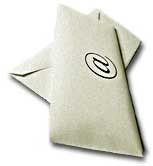 I place two envelopes before you where one contains twice the number of dollars as the other. Both of us are unaware of which envelope is the richer, and I offer you the opportunity to select one of them, and keep its contents. After a moment's pause, you select Envelope #1, open it, pocket the four dollars that it holds, and thank me for my generosity.
I place two envelopes before you where one contains twice the number of dollars as the other. Both of us are unaware of which envelope is the richer, and I offer you the opportunity to select one of them, and keep its contents. After a moment's pause, you select Envelope #1, open it, pocket the four dollars that it holds, and thank me for my generosity.But this event is not over. I then offer you the opportunity to return the four dollars, and select, instead, Envelope #2, which contains either two or eight dollars. Clearly, you had precisely a 50-50 chance of having selected the richer envelope to begin with. And this new game of double or something is clearly preferable to the fair game that you should have be offered, namely double or nothing, so you happily accept my new offer. Luck is with you as Envelope #2 contains eight dollars, and again you thank me.
I now offer you the chance to play the same game again, with two new envelopes. This time you select Envelope #2, but before you can open it, I stop you. "No need to even look at what is inside" I tell you. "Whatever its contents, when I offer you an opportunity to switch, you will do so, taking advantage of my double or something policy. So give me back Envelope #2, and take instead Envelope #1 from the start. Your best bet is to open Envelope #1." This argument seems sound, so we again trade envelopes, with you now holding Envelope #1.
But now, using precisely the same logic as before, I now convince you that your best bet is Envelope #2. In fact, regardless of what envelope you are holding, your best bet will always be the one that I am holding. Thus it appears that, despite the fact that your initial pick was completely random, you invariably make the wrong statistical choice no matter what your pick. This cannot be, and thus defines The Envelope Paradox.